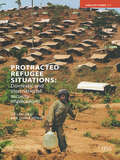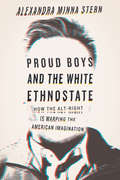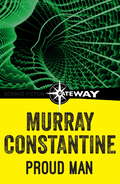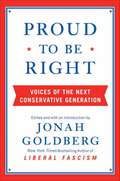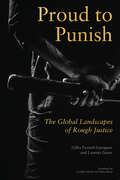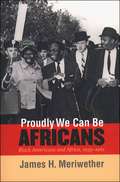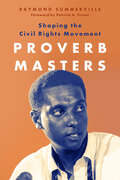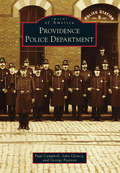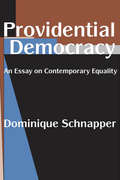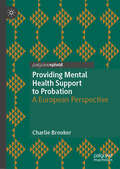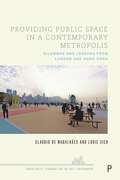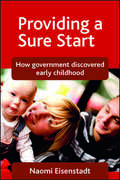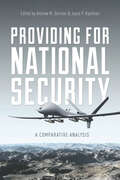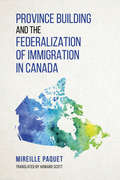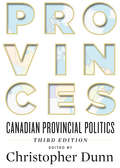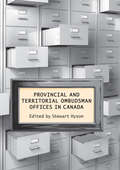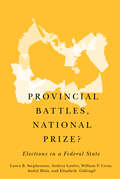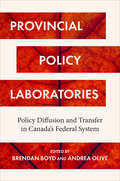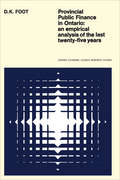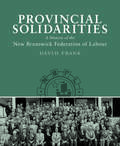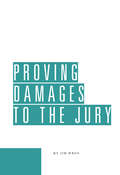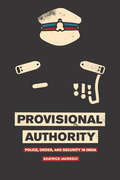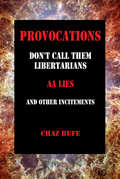- Table View
- List View
Protracted Refugee Situations: Domestic and International Security Implications (Adelphi series #375)
by Gil Loescher James MilnerProtracted refugee populations not only constitute over 70% of the world's refugees but are also a principal source of many of the irregular movements of people around the world today. The long-term presence of refugee populations in much of the developing world has come to be seen by many host states in these regions as a source of insecurity.In response, host governments have enacted policies of containing refugees in isolated and insecure camps, have prevented the arrival of additional refugees and, in extreme cases, have engaged in forcible repatriation. Not surprisingly, these refugee populations are also increasingly perceived as possible sources of insecurity for Western states. Refugee camps are sometimes breeding grounds for international terrorism and rebel movements. These groups often exploit the presence of refugees to engage in activities that destabilise not only host states but also entire regions.
Proud Boys and the White Ethnostate: How the Alt-Right Is Warping the American Imagination
by Alexandra Minna SternWhat is the alt-right? What do they believe, and how did they take center stage in the American social and political consciousness?From a loose movement that lurked in the shadows in the early 2000s, the alt-right has achieved a level of visibility that has allowed it to expand significantly throughout America's cultural, political, and digital landscapes. Racist, sexist, and homophobic beliefs that were previously unspeakable have become commonplace, normalized, and accepted--endangering American democracy and society as a whole. Yet in order to dismantle the destructive movement that has invaded our public consciousness, we must first understand the core beliefs that drive the alt-right.To help guide us through the contemporary moment, historian Alexandra Minna Stern excavates the alt-right memes and tropes that have erupted online and explores the alt-right's central texts, narratives, constructs, and insider language. She digs to the root of the alt-right's motivations: their deep-seated fear of an oncoming "white genocide" that can only be remedied through swift and aggressive action to reclaim white power. As the group makes concerted efforts to cast off the vestiges of neo-Nazism and normalize their appearance and their beliefs, the alt-right and their ideas can be hard to recognize. Through careful analysis, Stern brings awareness to the underlying concepts that guide the alt-right and animate its overlapping forms of racism, xenophobia, transphobia, and anti-egalitarianism. She explains the key ideas of "red-pilling," strategic trolling, gender essentialism, and the alt-right's ultimate fantasy: a future where minorities have been removed and "cleansed" from the body politic and a white ethnostate is established in the United States. By unearthing the hidden mechanisms that power white nationalism, Stern reveals just how pervasive this movement truly is.
Proud Man (Gateway Essentials #527)
by Murray ConstantineOriginally published in England in 1934, this searing, still timely novel offers and incisive critique of the sexual politics and militarism of England, and the West as a whole.Proud Man is told from the perspective of a "Genuine Person" who has been thrown back in time thousands of years from a peaceful future society. The Genuine Person comes from a people that are androgynous, self-fertilizing, and vegetarian; they live without a national government and artificial social divisions of gender and class. Taking on first female, then male form, the "Genuine Person" confronts the deeply troubled reality of England in the 1930s, still battered after one World War and on the road to another.
Proud to Be Right: Voices of the Next Conservative Generation
by Jonah GoldbergIn Proud to Be Right, Jonah Goldberg, the New York Times bestselling author of Liberal Fascism, presents voices of the next Conservative generation. A fresh and provocative collection of lively political writing from right wing writers under the age of 30, Proud to Be Right rebuts the conventional wisdom that Generation Y is a uniformly liberal demographic—and that intelligent young people today fall blindly into the Barack Obama camp.
Proud to Punish: The Global Landscapes of Rough Justice
by Gilles Gayer Laurent GayerA magisterial comparative study, Proud to Punish recenters our understanding of modern punishment through a sweeping analysis of the global phenomenon of "rough justice": the use of force to settle accounts and enforce legal and moral norms outside the formal framework of the law. While taking many forms, including vigilantism, lynch mobs, people's courts, and death squads, all seekers of rough justice thrive on the deliberate blurring of lines between law enforcers and troublemakers. Digital networks have provided a profitable arena for vigilantes, who use social media to build a following and publicize their work, as they debase the bodies of the accused for purposes of edification and entertainment. It is this unabashed pride to punish, and the new punitive celebrations that actualize, publicize, and commercialize it, that this book brings into focus. Recounted in lively prose, Proud to Punish is both a global map of rough justice today and an insight into the deeper nature of punishment as a social and political phenomenon.
Proudly We Can Be Africans
by James H. MeriwetherThe mid-twentieth century witnessed nations across Africa fighting for their independence from colonial forces. By examining black Americans' attitudes toward and responses to these liberation struggles, James Meriwether probes the shifting meaning of Africa in the intellectual, political, and social lives of African Americans. Paying particular attention to such important figures and organizations as W. E. B. Du Bois, Martin Luther King Jr., and the NAACP, Meriwether incisively utilizes the black press, personal correspondence, and oral histories to render a remarkably nuanced and diverse portrait of African American opinion.Meriwether builds the book around seminal episodes in modern African history, including nonviolent protests against apartheid in South Africa, the Mau Mau war in Kenya, Ghana's drive for independence under Kwame Nkrumah, and Patrice Lumumba's murder in the Congo. Viewing these events within the context of their own changing lives, especially in regard to the U.S. civil rights struggle, African Americans have continually reconsidered their relationship to contemporary Africa and vigorously debated how best to translate their concerns into action in the international arena.Grounded in black Americans' encounters with Africa, this transnational history sits astride the leading issues of the twentieth century: race, civil rights, anticolonialism, and the intersections of domestic race relations and U.S. foreign relations.
Proven Jury Arguments & Evidence
by Karen LiskoProven Jury Arguments & Evidence Dr. Karen Lisko has observed the deliberations of hundreds of mock juries in over 25 years of helping attorneys develop case strategies. She has also conducted scores of post-trial interviews with actual jurors. Her research findings have been compiled in Proven Jury Arguments & Evidence. This helpful book provides general recommendations for persuading all types of juries, and offers detailed advice for the following 9 types of cases: Negligence * Auto accidents * Police misconduct * Slips and falls * Medical malpractice * Products liability Business * Breach of business supply contract * Breach/delay of construction contract Employment * Race discrimination * Sexual harassment Learn about jury biases and key questions, what case elements juries find persuasive, potential winning case themes, effective case analogies, most important witnesses, rules of thumb for arguing damages, high-risk juror profiles, and pattern voir dire questions--all specific to case type and plaintiff or defendant.
Proverb Masters: Shaping the Civil Rights Movement
by Raymond SummervilleIn Proverb Masters: Shaping the Civil Rights Movement, author Raymond Summerville explores how proverbs and proverbial language played a significant role in the long civil rights era. Proverbs have been used throughout history to share and disseminate brief, powerful statements of truth and philosophical insight. Oftentimes, these sayings have helped unite people in struggles for social justice, serving as rallying cries for just causes. During the civil rights era, proverbs allowed leaders to craft powerful and evocative messages. These statements needed to be made implicitly, as explicit messages were often met with retaliation and even violence.Looking at the autobiographies, biographies, speeches, diaries, letters, and critical texts of Charles W. Chesnutt, Ida B. Wells, A. Philip Randolph, Bob Dylan, Malcom X, Stokely Carmichael, and Septima Clark, the volume analyzes how these figures employed proverbs in support of social justice causes and in civil rights struggles. Summerville argues that these individuals generated enough print material embedded with proverbs and proverbial language that they should be considered proverb masters. With chapters dedicated to each figure, Summerville reveals their adept uses of this powerful linguistic tool.
Providence Police Department (Images of America)
by George Pearson Paul Campbell John GlancyThe Providence Police Department has served New England's second-largest city from its beginnings in 1651 with the appointment of a town sergeant to today's force of nearly 500 men and women. Officially established in 1864, policing in Providence has changed considerably from the days of night watchmen armed with handheld rattle alarms and nightsticks. Whether quelling the violent street riots of 1914, enforcing Prohibition, or fighting the New England mob, the PPD has evolved to meet the complex challenges posed by the city. It also boasts a history of leadership among the nation's law enforcement agencies, being among the first to incorporate women into the department's ranks, create innovative campaigns to reduce traffic fatalities, and pioneer the use of trained canines to aid in police work. Today, cutting-edge telecommunications and forensic analysis in crime fighting continue to protect the city of nearly 178,000.
Providential Democracy: An Essay on Contemporary Equality
by Dominique SchnapperDemocracy posits the universality of the equality principle: a community of citizens is governed by the principle of the formal equality of all individuals, whatever their real social, cultural, or other inequalities. Democratization, on the other hand, is motivated by the ambition of ensuring the real equality of citizens, and not simply their formal equality. The dynamics of democracy are thus insured by the development of a welfare state that increasingly intervenes in order to satisfy the social and economic needs of individuals. Especially focused on France, yet informed by the experiences of other European countries, this book examines the dilemmas of the search for equality in society and politics.Democratization guarantees the rights of salaried workers and employees, the rights to material survival and housing, as well as health care, education, and culture. Today, however, as Schnapper observes, its action has become paradoxical. As the fruit of a praiseworthy concern to ensure the universality of rights, what Schnapper identifies as a "Providence State" now aims, by means of positive discrimination and other specific promotion policies, to defend the particular rights of certain categories of individuals. The action of the Providence State thus nourishes an aspiration: that the identities of historical collectivities gathered within the same national society be publicly recognized, and that these have rights. Equity thus supplants equality; and multiculturalism, universality. Such is the ordeal currently experienced by Western democracies, which are faced with the increasingly "providential" nature of their societies. Indeed, the author asks, how can a united political Europe be constructed on the ideals and institutions of citizenship, when European nations are becoming providential democracies?Providential Democracy offers a searching and timely critique of democratization that will be of interest to sociologists, political sci
Providing Mental Health Support to Probation: A European Perspective (Palgrave Studies in Risk, Crime and Society)
by Charlie BrookerThis short book provides a European-wide survey of mental health and probation. Drawing on a significant study, it explores the knowledge and attitudes to mental illness based on a sample of probation staff from 27 countries. It sets out the significance of mental health for probation staff and includes examples of good working practice, a pragmatic review of the literature and recommendations for further actions agreed by the Council of Europe. It seeks to improve the knowledge of probation staff about mental illness and outlines a future agenda for practice, service organisation and research.
Providing Public Space in a Contemporary Metropolis: Dilemmas and Lessons from London and Hong Kong (Urban Policy, Planning and the Built Environment)
by Louie Sieh Claudio De MagalhãesIncreasingly, public space provision and management are being transferred from the public sector to real estate developers, private sector organisations, voluntary groups and community bodies. Contrasting the more historical, horizontal character of London with the intense street life of high-rise Hong Kong, this book tells the story of the two cities’ relationships with non-traditional forms of public space governance. The authors consider the implications for the ‘publicness’ of these complex spaces and the challenges and impacts that different forms of provision have on those with a stake in them, and on the cities as a whole.
Providing a Sure Start: How government discovered early childhood
by Naomi EisenstadtThis book tells the story of Sure Start, one of the flagship programmes of the last government. It tells how Sure Start was set up, the numerous changes it went through, and how it has changed the landscape of services for all young children in England. Offering insight into the key debates on services for young children, as well as how decisions are made in a highly political context, it will be of keen interest to policy academics, senior managers of public services and all those with a keen interest in developing services for young children.
Providing for National Security: A Comparative Analysis
by Joyce P. Kaufman Andrew M. DormanProviding for National Security: A Comparative Analysis argues that the provision of national security has changed in the 21st century as a result of a variety of different pressures and threats. In this timely volume experts from both the academic and policy worlds present 13 different country case studies drawn from across the globe—including established and newer states, large and smaller states, those on the rise and those in apparent decline—to identify what these key players consider to be their national security priorities, how they go about providing national security, how they manage national security, and what role they see for their armed forces now and in the future. The book concludes that relative standing and the balance of power remains important to each state, and that all see an important role for armed forces in the future.
Province Building and the Federalization of immigration in Canada
by Mireille PaquetMost accounts of the provincial role in Canadian immigration focus on the experience of Quebec. In Province Building and the Federalization of Immigration in Canada, Mireille Paquet shows that, between 1990 and 2010, all ten provinces became closely involved in immigrant selection and integration. This considerable change to the Canadian model of immigration governance corresponds to a broader process of federalization of immigration, by which both orders of government became active in the management of immigration. While Canada maintains its overall positive approach to newcomers, the provinces developed, and continue to develop, their own formal immigration strategies and implement various selections and integration policies. This book argues that the process of federalization is largely the result of provincial mobilization. In each province, mobilization occurred through a modern iteration of province building, this time focused on immigrants as resources for provincial economies and societies. Advocating for a province-centred analysis of federalism, Province Building and the Federalization of Immigration in Canada provides key lessons to understanding the contemporary governance of immigration in Canada.
Provinces: Canadian Provincial Politics, Third Edition
by Christopher DunnProvinces is now established as the most comprehensive yet accessible exploration of Canadian provincial politics and government. The authors of each chapter draw on their particular expertise to examine themes and issues pertaining to all the provinces from a comparative perspective. The book is organized into four major sections – political landscapes, the state of democracy in the provinces, political structures and processes, and provincial public policy. The third edition features eleven new chapters, including: province building, provincial constitutions, provincial judicial systems, plurality voting in the provinces, voting patterns in the provinces, provincial public service, provincial party financing, provincial health policy, social policy, climate change, and labour market policy. All other chapters have been thoroughly revised and updated.
Provincial & Territorial Ombudsman Offices in Canada
by Stewart HysonParliamentary ombudsmen are appointed to investigate citizens' complaints and to provide checks on government administrative activity. In Canada, there are ten provincial and territorial ombudsmen, each with mandates over the whole of the public service within their regions. Though each ombudsman presents an annual report on his or her activities, there has been little sustained evaluation of the position's impact or its effectiveness.In this collection, contributors describe and assess the performance of the ten ombudsman offices in light of their multiple and evolving functions. Ombudsmen both investigate citizens' complaints and direct them to already-existing agencies. They sometimes educate the public about administrative processes and initiate probes of systemic issues in need of amelioration or change. An important evaluation of a little-studied institution, Provincial and Territorial Ombudsman Offices in Canada offers background and theory, case studies, and perspectives on the emerging challenges for the office in the twenty-first century.
Provincial Battles, National Prize?: Elections in a Federal State
by André Blais William P. Cross Andrea Lawlor Laura B. StephensonIn parliamentary systems like Canada, voters directly contribute to the election outcome only in their own riding. However, the focus of election campaigns is often national, emphasizing the leader rather than the local candidate, and national rather than regional polls. This suggests that elections are national contests, but election outcomes clearly demonstrate that support for parties varies strongly by province. Focusing on the 2015 Canadian election campaigns in British Columbia, Ontario, and Quebec, three large provinces with different subnational party systems, Provincial Battles, National Prize? evaluates whether we should understand elections in Canada as national wars or individual provincial clashes. The authors draw upon voter and candidate surveys, party campaign behaviour, and media coverage of the election to document how political parties vary their messages and strategies across provinces, how the media communicate and frame those messages, and how voters ultimately respond. The study shows that provincial variations in party support reflect differences in voters' political preferences rather than differences in party messages or media coverage. A novel and comprehensive study, Provincial Battles, National Prize? is the first and only thorough treatment of the party, media, and voter aspects of a federal election campaign through a subnational lens.
Provincial Battles, National Prize?: Elections in a Federal State
by André Blais William P. Cross Elisabeth Gidengil Andrea Lawlor Laura B. StephensonIn parliamentary systems like Canada, voters directly contribute to the election outcome only in their own riding. However, the focus of election campaigns is often national, emphasizing the leader rather than the local candidate, and national rather than regional polls. This suggests that elections are national contests, but election outcomes clearly demonstrate that support for parties varies strongly by province. Focusing on the 2015 Canadian election campaigns in British Columbia, Ontario, and Quebec, three large provinces with different subnational party systems, Provincial Battles, National Prize? evaluates whether we should understand elections in Canada as national wars or individual provincial clashes. The authors draw upon voter and candidate surveys, party campaign behaviour, and media coverage of the election to document how political parties vary their messages and strategies across provinces, how the media communicate and frame those messages, and how voters ultimately respond. The study shows that provincial variations in party support reflect differences in voters' political preferences rather than differences in party messages or media coverage. A novel and comprehensive study, Provincial Battles, National Prize? is the first and only thorough treatment of the party, media, and voter aspects of a federal election campaign through a subnational lens.
Provincial Policy Laboratories: Policy Diffusion and Transfer in Canada’s Federal System
by Brendan Boyd and Andrea OliveCanada's federal system, composed of ten provincial governments and three territories, all with varying economies and political cultures, is often blamed for the country's failure to develop coordinated policy responses to key issues. But in other federal and multi-level governance systems, the ability of multiple governments to test a variety of policy responses has been lauded as an effective way to build local and national policy. Despite high-profile examples of policy diffusion in Canada, there has been surprisingly little academic study of policy learning and diffusion among provinces. Featuring cutting-edge research, Provincial Policy Laboratories explores the cross-jurisdictional movement of policies among governments in Canada’s federal system. The book comprises case studies from a range of emerging policy areas, including parentage rights, hydraulic fracturing regulations, species at risk legislation, sales and aviation taxation, and marijuana regulation. Throughout, the contributors aim to increase knowledge about this understudied aspect of Canadian federalism and contribute to the practice of intergovernmental policymaking across the country.
Provincial Public Finance in Ontario: An Empirical Analysis of the Last Twenty-Five Years
by David FootThis detailed and informative study makes a timely contribution to a subject that has been the focus of much public discussion and debate in Ontario and elsewhere, namely the size and growth of the public sector. Working with the Public Accounts and other sources, Professor Foot offers both an historical account of, and an explanation for, the growth of provincial revenues and expenditures since the early 1950s. By concentrating on an analysis of the development of a single government over time, rather than adopting the traditional cross-section approach of analysing a number of junior-level governments. The study's conclusions are both informative and provocative. On the revenue side, a rate-base approach which separates discretionary from automatic changes in revenue determinants is shown to provide sufficient flexibility to accommodate the analysis and explanation of a wide range of specific revenues. On the expenditure side, the provincial government is found to adjust reasonably slowly to new levels of desired expenditures which appear to be determined primarily by demand variables. Of particular interest are findings which suggest that urbanization and elections have had little effect on expenditures and that available federal money has tended to be a substitute for provincial funds. In addition, the author notes that provincial expenditure patterns are consistent with either a revenue-led interpretation, where the recent availability of pension funds has stimulated expenditures, or a leading-sector interpretation, which implies a longer-run coordinated view of provincial public development. This study should stimulate a more informed discussion of the determinants and effects of provincial public finance in Ontario. It will appeal not only to those interested in the behaviour of junior-level governments but also to anyone interested in the size and growth of the public sector, in Ontario or elsewhere.
Provincial Solidarities: A History of the New Brunswick Federation of Labour
by David FrankEstablished in 1913, the New Brunswick Federation of Labour is the second oldest provincial federation of labour in Canada. Its history began in early campaigns for workers’ compensation and union recognition and continues today in the latest battles to defend social standards, secure employment, and union rights. Active initially in the port city of Saint John and the railway centre of Moncton, the federation soon expanded to include workers in the mines and mills of the north, taking up the causes of public employees and women workers and confronting the realities of life and work in a bilingual society. A pioneering study, written in clear and forceful prose, this is the untold story of provincial labour solidarities that succeeded in overcoming divisions and defeats to raise the status of working men and women within New Brunswick society. Drawing on archives, newspapers, and workers’ own descriptions of their experiences, Frank makes an original contribution to our understanding of the political, economic, and social development of the province. In so doing, he helps meet the need for an informed public awareness of the history of workers and unions in all parts of Canada.
Proving Damages to the Jury
by Jim WrenBig damage awards don't just happen. You need a plan for success. Any lawyer who has tried a damages case has experienced the quandary: What damage number do I give the jury? Is it enough? Is it too much? How do I ask for it? How do I support it? To give your clients justice, you need something more than a "hit or miss / hope and go" approach to damages. You need an intelligent damages strategy that encompasses every phase of the litigation and trial. Proving Damages to the Jury gives you that strategy. Relying on a solid foundation of current jury science research and more than 30 years of courtroom experience, author Jim Wren walks you through every step of your damages case, from the initial screening of a potential client to closing argument at trial. These abbreviated excerpts are just a sampling of what you will learn: Before Trial Discovery Develop a discovery plan to support your complete damages story. Take video depositions of your damage fact witnesses. Set up damage issues with requests for admission. Challenge the defense medical expert Visuals Use the seven stages of your damage story as the organizing principle for your visual strategy. Translate your damage story into visuals by working through these ten key questions: Enhance your credibility by making "verifiable proof" a focal point of your visual strategy. At Trial Voir Dire Raise the issue of frivolous lawsuits. Address jurors' reluctance to award damages for unintentional conduct. Plan the sequence of your questions. Opening Statement Focus on choices, rather than results, in presenting damages. Start with the question for the jury. Help jurors understand the significance of their role. Cross-Examination Understand what makes cross examination powerful. Use "you can understand" questions to validate the consequences of the plaintiff's injury. Encourage juror anger as a motivator for damages. Closing Argument Provide guidance for intangible damages. Help jurors make a significant difference.
Provisional Authority: Police, Order, and Security in India
by Beatrice JaureguiPolicing as a global form is often fraught with excessive violence, corruption, and even criminalization. These sorts of problems are especially omnipresent in postcolonial nations such as India, where Beatrice Jauregui has spent several years studying the day-to-day lives of police officers in its most populous state, Uttar Pradesh. In this book, she offers an empirically rich and theoretically innovative look at the great puzzle of police authority in contemporary India and its relationship to social order, democratic governance, and security. Jauregui explores the paradoxical demands placed on Indian police, who are at once routinely charged with abuses of authority at the same time that they are asked to extend that authority into any number of both official and unofficial tasks. Her ethnography of their everyday life and work demonstrates that police authority is provisional in several senses: shifting across time and space, subject to the availability and movement of resources, and dependent upon shared moral codes and relentless instrumental demands. In the end, she shows that police authority in India is not simply a vulgar manifestation of raw power or the violence of law but, rather, a contingent and volatile social resource relied upon in different ways to help realize human needs and desires in a pluralistic, postcolonial democracy. Provocative and compelling, Provisional Authority provides a rare and disquieting look inside the world of police in India, and shines critical light on an institution fraught with moral, legal and political contradictions.
Provocations: Don't Call Them Libertarians, AA Lies, and Other Incitements
by Chaz BufeProvocations is a collection of Chaz Bufe's writings on anarchism, atheism, religion, Alcoholics Anonymous, political and religious cults, new age nuttiness, political and social repression in the United States, the phoniness of contemporary "libertarianism," and roads to change. The tone ranges from the serious and analytical to the sarcastic and darkly humorous in this wide-ranging exercise in critical thinking.
